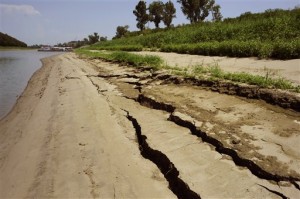Mississippi River Reaches Historic Lows
 The Mississippi River has gone from one extreme to another. Last year it was historic floods that forced evacuations and caused up to $4 billion in economic damage. This year it’s severe drought causing commercial barges to run aground and reducing the flow of trade.
The Mississippi River has gone from one extreme to another. Last year it was historic floods that forced evacuations and caused up to $4 billion in economic damage. This year it’s severe drought causing commercial barges to run aground and reducing the flow of trade.Water levels are 50 feet below last year’s levels along some areas of the Mississippi River. In some cases, water levels barely reach 5 feet, making it difficult for some barges to reach their destinations. As the severe drought in the South gets worse, barge operators are calling the crisis “near critical.”
MSNBC reports on the drought:
In July, water levels in Cairo, Memphis, Tenn., and Vicksburg, Miss., dipped below those of the historic drought of 1988. That’s affecting everything from commerce on the maritime superhighway to recreation to the drinking water in Louisiana.
The biggest impact may be on shipping. “It’s getting near critical,” said Austin Golding, a third-generation co-owner of Vicksburg, Miss.-based Golding Barge Lines. “Without more rain, we’re heading into uncharted territory.”
About $180 billion worth of goods move up and down the river on barges, 500 million tons of the basic ingredients for much of the U.S. economy, according to the American Waterways Operators, a trade group. It carries 60 percent of the nation’s grain, 22 percent of the oil and gas and 20 percent of the coal, according to American Waterways Operators. It would take 60 trailer trucks to carry the cargo in just one barge, 144 18-wheeler tankers to carry the oil and gas in one petroleum barge.
Last year’s flooding moved a large amount of soil and silt into the river, making the problem worse by elevating the riverbed:
Because of that sediment in a flood, “as the ceiling rises, so does the floor,” said Golding. “We’ve just dealt with a historic flood, then the water drops…. We have some 50-year guys who’ve never seen anything like this before. It’s a completely different river than anybody’s ever seen.”
Some companies have reduced their loads by 25 percent due to the low water levels, making it far more expensive to ship products along the river. In July, the president of the largest barge company on the Mississsippi River predicted that “the vast majority of commerce would have to stop” without rain.
July was the hottest month on record for the U.S., according to the National Oceanic and Atmospheric Administration. That helped spread drought to 78 percent of the country — with 24 percent in “exceptional” drought conditions.
July was also the fourth hottest month globally — marking the 329th consecutive month that global average temperatures were above the 20th century average, according to NOAA.
You can return to the main Market News page, or press the Back button on your browser.

